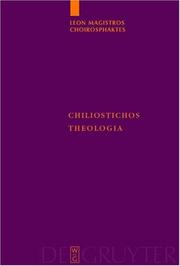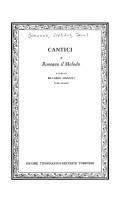| Listing 1 - 10 of 17 | << page >> |
Sort by
|
Book
Abstract | Keywords | Export | Availability | Bookmark
 Loading...
Loading...Choose an application
- Reference Manager
- EndNote
- RefWorks (Direct export to RefWorks)
Christian poetry, Byzantine --- History and criticism. --- Romanus, --- Criticism and interpretation.
Book
ISBN: 9025609759 Year: 1988 Publisher: Amsterdam Hakkert
Abstract | Keywords | Export | Availability | Bookmark
 Loading...
Loading...Choose an application
- Reference Manager
- EndNote
- RefWorks (Direct export to RefWorks)
Christian poetry, Byzantine --- History and criticism --- Elytēs, Odysseas,

ISBN: 3110175312 3110895153 9783110175318 Year: 2012 Volume: 6 Publisher: Berlin ; Boston : De Gruyter,
Abstract | Keywords | Export | Availability | Bookmark
 Loading...
Loading...Choose an application
- Reference Manager
- EndNote
- RefWorks (Direct export to RefWorks)
Die Theologie in tausend Versen des Leon Magistros Choirosphaktes, eines hervorragenden byzantinischen Diplomaten des 10. Jahrhunderts, ist ein philosophisch-theologisches Lehrgedicht, das an einen jungen Kaiser (Konstantinos VII. Porphyrogennetos?) gerichtet ist. Das Hauptziel der vorliegenden Ausgabe liegt in der sprachlichen Erschließung des in einer einzigen Handschrift (Vat. gr. 1257) nicht besonders vorteilhaft überlieferten Textes, der bis in unsere Tage verborgen geblieben ist und nun erst rund zehn Jahrhunderte nach seiner Entstehung zum ersten Mal in einer vollständigen Form gedruckt vorliegt. Das Gedicht wird von einer Übersetzung begleitet, die in erster Linie dazu dienen soll, die Wege zum Verständnis des an sich schwierigen und an manchen Stellen obskuren Textes zu ebnen. Den gleichen Zweck verfolgt auch der Kommentar. Vier Indizes runden die Ausgabe ab. The Theology in a Thousand Verses, written by Leon Magistros Choirosphaktes, an outstanding tenth-century Byzantine diplomat, is a philosophical and theological didactic poem addressed to a young emperor (perhaps Constantine VII Porphyrogenitus). The main objective of the present edition is to provide a linguistically accessible text. Handed down in a single manuscript (Vat. gr. 1257) under inauspicious conditions, the poem had been hidden away to this day and is printed here in its entirety for the first time since its creation some ten centuries ago. It is accompanied in this book by a translation and a commentary intended primarily to clarify the inherently difficult and sometimes obscure text. The volume also includes four indexes.
Christelijke poëzie [Byzantijnse ] --- Christian poetry [Byzantine ] --- Poésie chrétienne byzantine --- Christian poetry, Byzantine --- Theology --- Christian poetry, Byzantine. --- Christian theology --- Theology, Christian --- Christianity --- Religion --- Byzantine Christian poetry --- Byzantine poetry --- Poetry --- Theology - Poetry

ISBN: 8802057346 9788802057347 Year: 2002 Publisher: Torino Unione tipografico-editrice torinese
Abstract | Keywords | Export | Availability | Bookmark
 Loading...
Loading...Choose an application
- Reference Manager
- EndNote
- RefWorks (Direct export to RefWorks)
Book
Year: 1892 Publisher: Cracoviae: Sumptibus academiae litterarum,
Abstract | Keywords | Export | Availability | Bookmark
 Loading...
Loading...Choose an application
- Reference Manager
- EndNote
- RefWorks (Direct export to RefWorks)
Book
Year: 1967 Publisher: München : Beck,
Abstract | Keywords | Export | Availability | Bookmark
 Loading...
Loading...Choose an application
- Reference Manager
- EndNote
- RefWorks (Direct export to RefWorks)
Christian poetry, Byzantine --- Hymns, Greek --- History and criticism. --- Romanus, --- Language. --- Criticism, textual.
Book
Year: 1985 Publisher: Lovanii : Peeters,
Abstract | Keywords | Export | Availability | Bookmark
 Loading...
Loading...Choose an application
- Reference Manager
- EndNote
- RefWorks (Direct export to RefWorks)
Hymns, Greek --- Christian poetry, Byzantine --- History and criticism. --- History and criticism. --- Romanus, --- Ephraem, --- Jesus Christ --- In literature. --- Bible. --- Versions --- Diatessaron.
Book
ISBN: 9780812249071 Year: 2017 Publisher: Philadelphia (Pa.) : University of Pennsylvania press,
Abstract | Keywords | Export | Availability | Bookmark
 Loading...
Loading...Choose an application
- Reference Manager
- EndNote
- RefWorks (Direct export to RefWorks)
Christian poetry, Byzantine --- Hymns, Greek --- History and criticism. --- History and criticism. --- Mary, --- Mary, --- Romanus, --- History and criticism. --- In literature.
Book
Year: 1977 Publisher: Paris : Beauchesne,
Abstract | Keywords | Export | Availability | Bookmark
 Loading...
Loading...Choose an application
- Reference Manager
- EndNote
- RefWorks (Direct export to RefWorks)
Christian poetry, Byzantine --- Poésie chrétienne byzantine --- History and criticism. --- Histoire et critique --- Romanus, --- Criticism and interpretation.
Book
ISBN: 9780674290938 Year: 2024 Publisher: Cambridge Harvard University Press
Abstract | Keywords | Export | Availability | Bookmark
 Loading...
Loading...Choose an application
- Reference Manager
- EndNote
- RefWorks (Direct export to RefWorks)
"Romanos was a sixth-century Byzantine poet-composer and performer of ritual songs, featuring both didactic and dramatic elements, for the emerging Christian rituals and festivals. Future generations were to call these songs kontakia, a genre that came about at the convergence between the Greek-speaking world and Syriac poetry. The focus of this volume is on Romanos's kontakia that include female characters as protagonists, antagonists, or important supporting characters. From villains to heroines, leaders to followers, saints to sinners, from the exceptionally towering Mother of God to the licentiously lustful Potiphar's wife-these characters may grant us limited insights into the mundane realities of women's lives in Constantinople. The songs represent a male gaze, and literary women rarely behave like physical women anyway. Nevertheless, many of the characters are portrayed with a remarkable psychological depth, combining outstanding boldness with inner struggles of doubt and desires and the sense of being pulled in various directions. With determined faith or faithless determination, bursting with love or wanting in ardor, these women embody the complexities of Christian life. The first four songs in this collection relate stories known from the book of Genesis. The female characters are not protagonists, but Romanos gives them important roles in the ancient narratives of temptation and envy, faithfulness and sacrifice. Two kontakia feature prophetic male protagonists but have important female characters. The next five hymns relate stories originating from the Christian gospels. They have female protagonists, and the narratives convey various corporeal encounters with Christ. The final section contains songs about the Virgin Mary, or Theotokos (God-bearer, Mother of God) as she is often called in Byzantine Christianity. Scholars and other modern readers ask questions about gender dynamics in history, and Romanos's kontakia collected in this volume provide a valuable source for such enquiries. His songs offer intriguing perspectives on gendered ideas and ideals in early Christian Byzantium"--
Christian poetry, Byzantine --- Hymns, Greek --- Women in the Bible --- Women in literature --- Themes, motives --- Mary, --- In literature.
| Listing 1 - 10 of 17 | << page >> |
Sort by
|

 Search
Search Feedback
Feedback About UniCat
About UniCat  Help
Help News
News